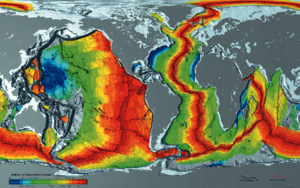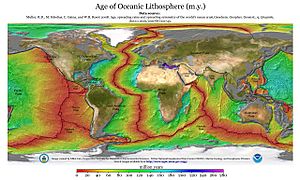Oceanic crust facts for kids
Oceanic crust is the part of our Earth's outer shell that lies beneath the oceans. Think of it as the ocean floor! It's a layer of solid rock that makes up the bottom of the deep sea. This crust is always moving and changing, even though we can't feel it.
Oceanic crust is mostly made of dark, heavy rocks called mafic rocks. These rocks are rich in minerals like magnesium and iron. The oceanic crust is thinner than the land we live on (called continental crust). It's usually less than 10 kilometers (about 6 miles) thick. Even though it's thinner, it's actually heavier or more dense. It weighs about 3.3 grams for every cubic centimeter.
Contents
Oceanic Crust: Earth's Underwater Floor
What is Oceanic Crust Made Of?
Oceanic crust is mostly made of a type of rock called basalt. Basalt is a dark, fine-grained volcanic rock. It forms when hot, melted rock (called magma) cools down quickly. This is different from the continental crust, which is made of lighter rocks like granite.
How Oceanic Crust Forms and Changes
Oceanic crust doesn't last forever. It usually exists for about 200 million years before it's recycled. New oceanic crust is always being made at special places called mid-ocean ridges. These are like underwater mountain ranges.
Here's how it works:
- Hot magma from deep inside the Earth rises up at these ridges.
- When the magma reaches the surface, it cools and hardens, forming new rock.
- This new rock pushes the older crust away from the ridge.
- As the crust moves away, it gets cooler and heavier.
- Over time, sediment (like sand and mud) can pile up on top of it.
This process is part of what causes plate tectonics, which is the movement of Earth's large tectonic plates.
Related pages
Images for kids
See also
 In Spanish: Corteza oceánica para niños
In Spanish: Corteza oceánica para niños
 | Shirley Ann Jackson |
 | Garett Morgan |
 | J. Ernest Wilkins Jr. |
 | Elijah McCoy |




